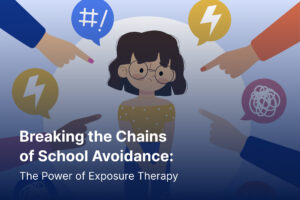Parents of kids with school avoidance just want to help their kids get back to school. It’s a daily grind of frustration and fear. Many of these kids have anxiety disorders, depression, learning differences, PTSD, OCD and other related issues.
When schools are supportive, intervene early and utilize their resources, it vastly improves outcomes. If the school doesn’t provide supportive interventions, then parents are left on their own and deflated.
On our website and FB group, we discuss federal laws; Section 504, the Individuals with Disabilities Education Act (IDEA), and the Americans with Disabilities Act (ADA). These laws protect the rights of a child with a disability to get an education (a/k/a FAPE, Free Appropriate Public Education).

Under these laws, mental health disorders and learning differences are considered disabilites. Kid’s with disabilities sometimes need a 504 plan or Individualized Education Plan to be able to access their education. This is no different than a person in a wheel chair having the right to access a building.
It takes a lot of reading and researching In order to understand federal and state educational laws. Bottom-line; its not fun.
So for all you parents reading 504 , FAPE, IDEA and ADA, laws, take a minute to laugh and get inspired.
After I watched these two clips, I gained hope and energy to continue advocating for school avoidance awareness and improvement. I hope it does the same for you.
An awe-insipiring woman named Judy Heumann is the focus of these two videos. The first one here is from Comedy Central’s Drunk History show and covers Section 504 from the Office of Civil Rights. There are curse words so don’t let your kiddos hear.
What an inspiration. Does it make you feel like you want to hop on a bus with 50 other like-minded advocates?
This clip from Comedy Central’s Daily Show introduces us to the real Judy Heumann. She explains that mental health disorders are often a hidden diability and deserve the same equal protections under the law.
Did judy give you courage to keep fighting for your child’s rights?






